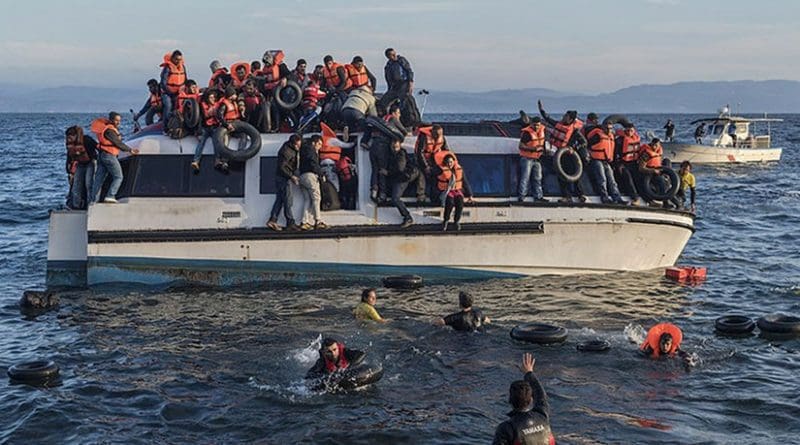Study Says EU Governments May Have Deliberately Allowed Migrants To Cross Borders
European border controls that allow migrants into bypass them may have been part of a deliberate policy to boost domestic economies and garner party-political support, according to new LSE research.
A study focusing on Greece, but with wider implications across European governments, found that migrants have often been essential to domestic political and economic interests such as serving the needs of large informal labour markets that rely on cheap labor.
The study concludes that policies and practices of border control which purport to exclude all migrants can in fact be imperfect by design. Governments may adopt policies and promote practices that essentially relax border controls so as to enable the mass import of exploitable migrant labor. State policies restricting welfare and employment rights, combined with tolerance or even active support towards practices of violent intimidation, serve to bolster migrants’ exploitability in the labor market.
Dr Leonidas Cheliotis, Assistant Professor in Criminology at LSE’s Social Policy Department, focused on Greece, a country with exceptionally high levels of undocumented migrants and at the heart of the current global refugee crisis with regular media reports of tragedies at sea. Its immigration policy has undergone little substantive change since the early 1990s.
The paper notes that “in trying to enter Greece, be it by land or sea, irregular migrants often find themselves at serious risk of death.” Irregular migration has nonetheless undergone an “impressive overall rise” over the years. By 2011, for example, the estimated number of undocumented migrants reached 390,000, nearly one-third of a total of 1.2 million immigrants in Greece, itself comprising around one-tenth of the country’s total population.
The research argues that Greece is a common destination for irregular migrants only partly due to its unusually extensive borderline, including hundreds of remote islands, which are difficult to police. Large flows of irregular immigration have effectively been channelled towards Greece’s borders by ever-tightening restrictions imposed across Europe upon irregular immigration from other parts of the world, in the form, for example, of stricter policing of national borders.
“Most crucially, however, and despite repeated official proclamations to the contrary, the Greek state itself has in the past introduced policies and promoted practices that have helped to maintain the size of the irregular migrant population in the country at consistently high levels, not only engaging in piecemeal attempts at blocking irregular migration routes into Greece, but also failing to facilitate processes of asylum, regularization, deportation, or even voluntary repatriation for migrants without papers.” Whilst, then, irregular migrants typically view Greece as a transit country on their way to mainland Europe, where the prospects of long-term and permanent settlement appear more appealing, in practice they commonly find themselves ‘trapped’ in the country.
The study adds that asylum and regularization procedures have been notoriously arduous, protracted and, for the overwhelming majority of applicants, ineffectual. Efforts to apprehend and deport irregular migrants have long been known to be of limited efficiency and effectiveness, voluntary repatriation schemes for undocumented migrants remain little used, and the legal maximum length of administrative detention of irregular migrants underwent repeated extensions before being rendered indefinite in April 2014. By 2012, Greece had used no more than 40 of the 250 million Euros of allocated EU funding for immigration and asylum management, according to the research.
All this, the study argues, has been in good part because irregular migrants have lent themselves as a highly exploitable workforce fit for the needs of Greece’s large informal labor market, itself estimated to account for around 25 per cent of GDP, one of the highest proportions in the EU. Broader developments such as the construction boom in the 1990s, the expansion of export-oriented labor-intensive farming, and the rise of dual-income nuclear families against the backdrop of persistently minimal levels of state welfare provision for the elderly and young children, have heightened demand for a wide range of low-prestige and poorly paid menial labor, such as building, fruit-picking and domestic care work, which unemployed Greek nationals have grown increasingly likely to shun, many even under conditions of financial crisis.
The research further explores the apparent paradox that irregular migrants are regarded by large segments of the Greek public as a threat to society and are blamed for crime in particular – views that have long been reinforced by a range of political parties in the country. Yet the aggressive policies and practices thereby authorized serve to heighten migrants’ exploitability in the workplace.
According to Dr Cheliotis, “Since the 1990s, the mass import of irregular migrant workforce has been crucial to Greece’s large informal labour market and to native employers operating therein, just as it has been essential, by extension, to political elites seeking to retain and broaden their electoral clienteles. At the same time, irregular migrants have at best been given meager access to social and legal rights and entitlements, and under the pretext of fighting crime across the country, they have also been placed under constant threat of physical violence by a range of state and non-state actors, from the police to members of the neo-fascistic party Golden Dawn. In effect, then, a continuum of violence has been formed, forcing migrants either to submit to any available condition of work or to await for their chance in a disciplined fashion. There are, to be sure, segments of the Greek public that have treated migrants with humanity and respect – attitudes also extended to refugees more recently. And, in any case, responsibility for the ways in which immigrants are treated on Greek soil does not reside exclusively within Greece itself, not to mention that the case of Greece is not without parallels elsewhere in Europe. But these caveats should not obfuscate immigrants’ plight in the country, nor of course could they plausibly excuse it.”

